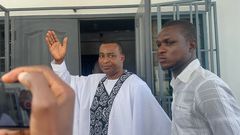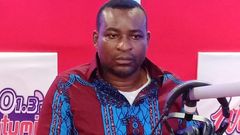After three nights in police custody, Bernard Antwi Boasiako—widely recognized as Chairman Wontumi and a prominent figure in Ghana’s New Patriotic Party (NPP)—has regained his freedom. This development comes as he successfully met the bail requirements set in two ongoing illegal mining (galamsey) cases being pursued at the High Court in Accra. The story has sent reverberations across the West African political scene, sparking vigorous debate about illicit mining, regulatory enforcement, and the intersection of politics with legal accountability.
Chairman Wontumi’s release follows a period of uncertainty after he initially failed to satisfy bail terms imposed on October 7, 2025, by Accra’s Criminal Division of the High Court. According to legal analysts in Accra, failure to meet stringent bail requirements is not uncommon in high-profile cases, especially where significant sums and strict surety qualifications are involved.
First Case: GH₵15 Million Bail and Stringent Restrictions

EOCO arrests NPP’s Ashanti Regional chairman Wontumi after CID interrogation
The first of the two cases saw the Accra High Court, presided over by Justice Mary Maame Ekue Yanzuh, grant Chairman Wontumi bail in the staggering amount of GH₵15 million. Judicial authorities underscored the gravity of the allegations, noting that the charges relate to breaches of Ghana’s mining laws: specifically, six counts involving the alleged unlawful assignment of mineral rights and the facilitation of unlicensed mining activities, or ‘galamsey’ as it’s famously known in the region.
Besides the financial condition, the court applied further restrictions for transparency and to prevent evasion. Wontumi was placed on a stop list, effectively barring him from exiting or entering the country via official points until further notice. These kinds of directives, legal experts note, are intended to prevent the flight of high-profile accused individuals—especially in transnational or high-stake offenses.
He stands charged not only as an individual but also alongside Kwame Antwi, a director of Akonta Mining, and the company itself. The accusations reflect a broader crackdown on illegal mining that affects the health of West African environments and communities, something Nigerian and regional observers have been following with keen interest given the impact of similar mining issues across the subcontinent.
Fulfilment of bail terms required three sureties, at least two of whom had to prove ownership of landed property within the court’s jurisdiction. Wontumi was also compelled to deposit all travel passports with the court’s Registrar and will remain under travel restrictions pending further court decisions. These are standard practices in high-value financial crime and environmental offense cases across both Ghana and Nigeria, reflecting attempts to tighten oversight and prevent circumvention of the justice system.
Additionally, the court mandated that the sureties each submit photocopies of their Ghana Cards as well as their digital residential addresses. To help monitor compliance, Chairman Wontumi is required to report to the investigating officer on the first and third Mondays of every month, while the officer must keep the court updated on these periodic check-ins. Legal watchers from universities in Lagos and Accra say such reporting requirements are becoming more common in West African bail protocol, aligning local procedures with emerging international standards.
Second Case: New Allegations Surface and Fresh Bail Conditions

No sooner had Chairman Wontumi secured his freedom in the first case than he found himself rearrested on new allegations. This time, he appeared with four others before a different High Court on a fresh set of charges centered on illegal mining.
Prosecutors allege that Wontumi and his co-accused are responsible for seven illegal mining-related offenses, including two counts of mining without a license. The charges further allege abetment in the unauthorized felling of trees and erecting buildings within protected forest reserves. All five have pleaded not guilty. Nigerian policy experts believe these cases point to a widespread, entrenched challenge that plagues many resource-rich African economies—where illegal resource extraction undermines both local development and environmental stability.
For the second set of charges, Wontumi was granted bail of GH₵10 million, with two sureties required. The trial was postponed until November 4th, 2025, providing time for legal teams to prepare. According to a Ghanaian court observer, such adjournments are not out of place in complex, multi-accused cases, particularly where environmental damage is alleged and substantial documentation needs to be reviewed.
Cumulatively, these high-profile cases are drawing renewed attention to the scourge of illegal mining across West Africa, including Nigeria, Ghana, and Côte d’Ivoire. Beyond the courtrooms, environmental advocacy groups are raising alarms about the irreversible damage galamsey causes, including deforestation, water pollution, and loss of arable land. For example, Ghana’s Tano Nimire Forest Reserve, reportedly affected in the current cases, is an ecologically vital area. Nigerian environmentalists point to similar struggles in places like Zamfara, where artisanal mining has caused lead poisoning and significant health crises.
Legal frameworks in Nigeria, Ghana, and other West African nations have been strengthened in recent years, aiming for stricter monitoring, harsher penalties, and increased community policing. However, enforcement challenges abound, with powerful local and national actors often evading meaningful sanctions—a dynamic observers worry may undermine rule of law and sustainable development on the continent.
As Chairman Wontumi maintains his innocence and prepares for his upcoming court dates, the spotlight remains firmly on how Nigerian, Ghanaian, and broader African institutions handle such high-profile environmental crime allegations. Analysts like Dr. Chuka Ihejirika, an environmental law lecturer in Lagos, remark: “These trials are a litmus test for West Africa’s commitment to combating illegal mining and holding even the most politically connected individuals to account.”
Meanwhile, local communities, especially those closest to affected mining regions, remain divided—some see these prosecutions as vital for protecting livelihoods and heritage, while others worry about political motivations or the potential impact on local jobs. “Our rivers and farmlands are at stake,” said a youth leader from Obuasi, Ghana, during a recent radio discussion, “but the courts must act fairly. We need justice, not just headlines.”
As the cases proceed, the region will be watching closely to see if the outcomes set new precedents for tackling illicit mining and environmental abuse—not just in Ghana, but across Africa’s expanding economies. The global significance of mineral resources originating from West Africa, coupled with rising international calls for ethical sourcing, means these trials could shape discussions far beyond the continent.
What is your view on the crackdown against illegal mining and the prosecution of public figures in West African countries? Do you think these high-profile cases inspire real change, or do they risk being mere political theatre? Drop your comment below and follow us for the latest updates on legal battles, environmental issues, and politics across Nigeria, Ghana, and the continent.
For support, questions, or to share your opinion, write to support@nowahalazone.com.
Stay connected: follow us for in-depth updates and local analysis on Facebook, X (Twitter), and Instagram!










